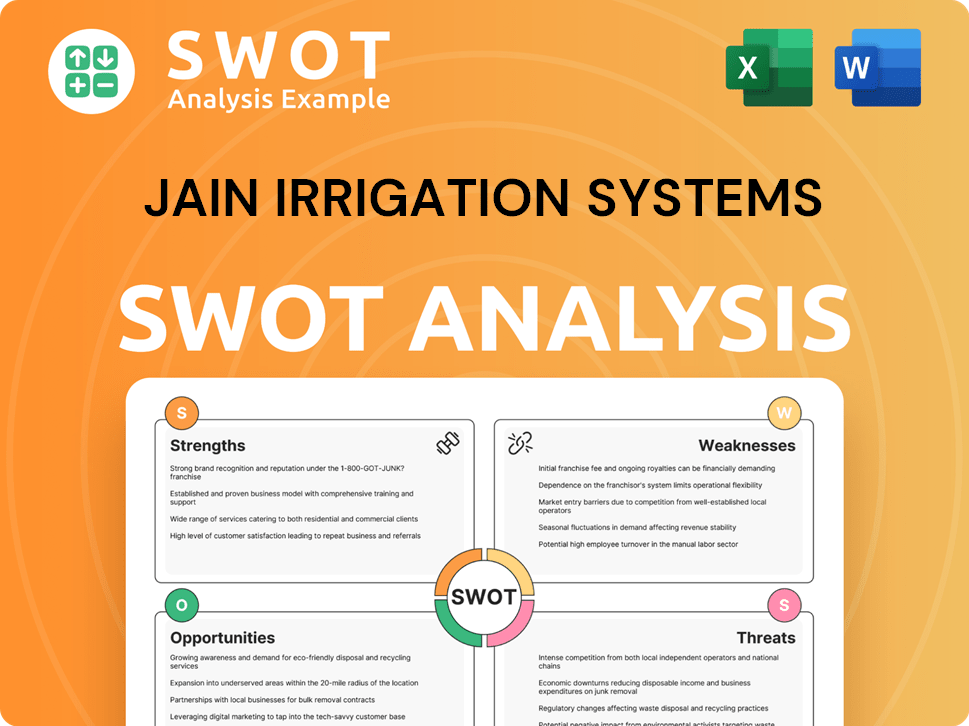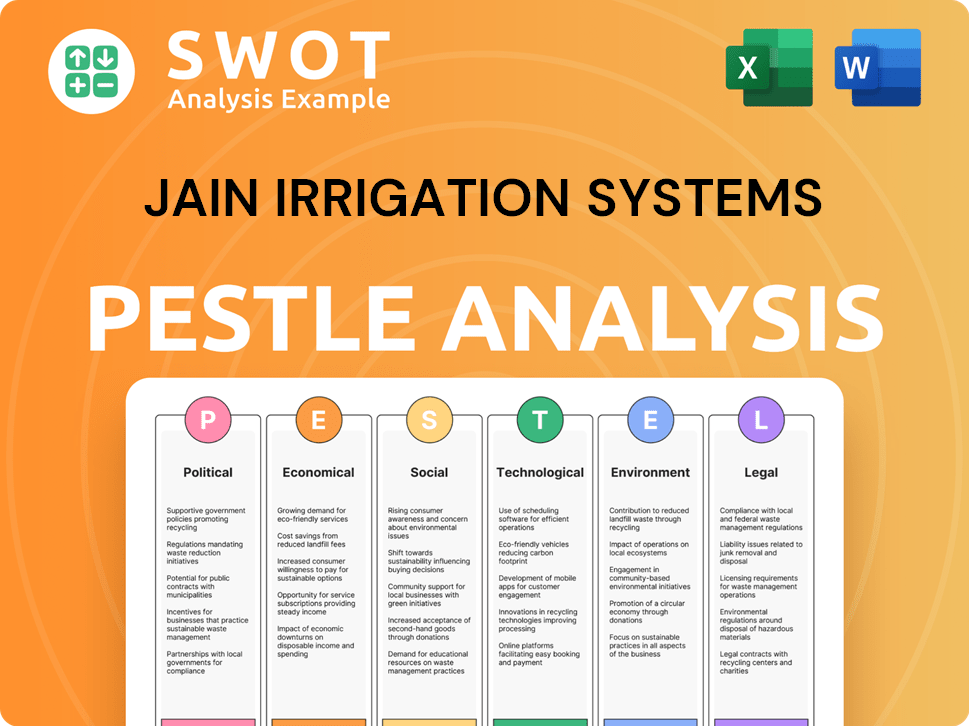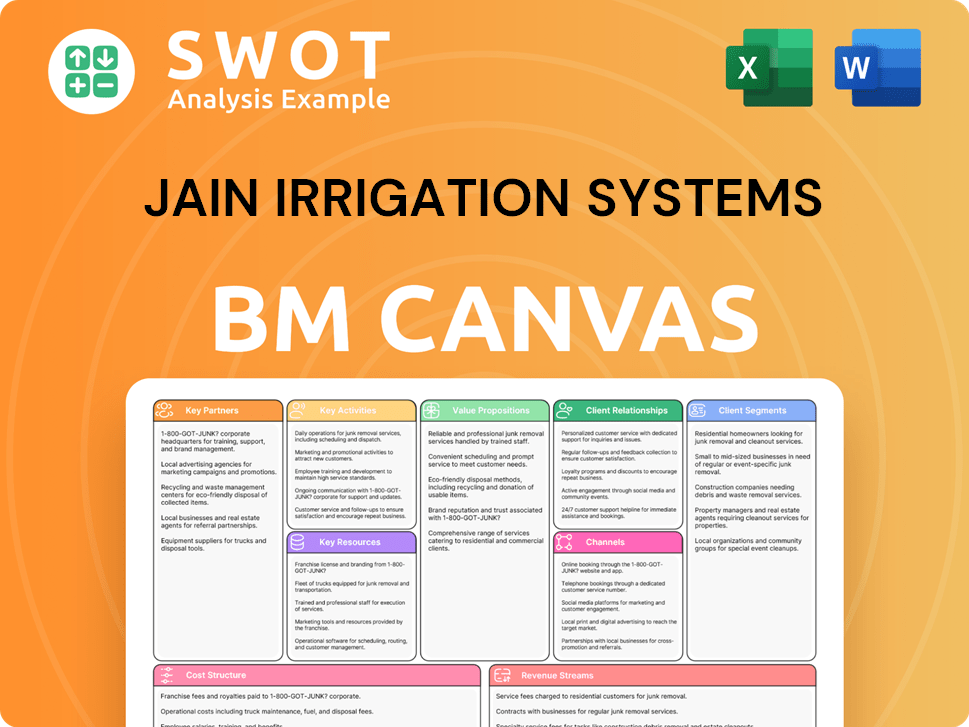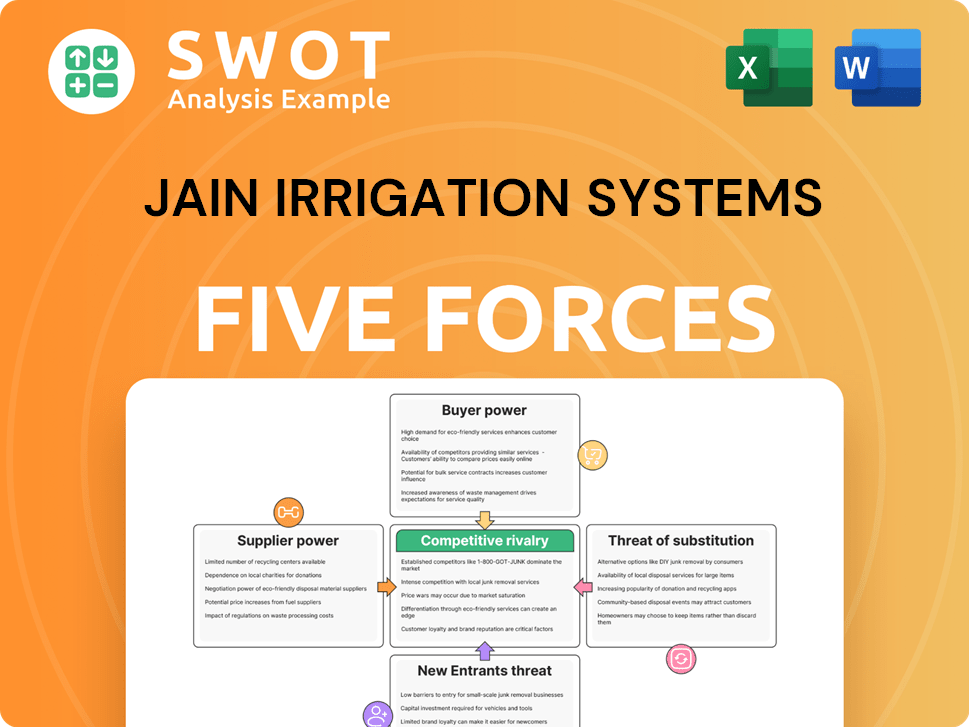Jain Irrigation Systems Bundle
How Does Jain Irrigation Systems Thrive in a Changing World?
Jain Irrigation Systems, a global leader in agricultural solutions, has a significant impact on the industry. With a presence in over 126 countries and a commitment to sustainable practices, Jain Irrigation Company is at the forefront of innovation. This in-depth analysis explores the core of their operations, from Jain Irrigation Systems SWOT Analysis to their financial performance.

This exploration will delve into the company's multifaceted approach to irrigation systems and agricultural solutions. Understanding Jain Irrigation's strategies, including their focus on drip irrigation and technological advancements, is crucial for anyone interested in the future of farming. We'll examine how Jain Irrigation Systems navigates the competitive landscape and contributes to global water conservation efforts, offering insights into their long-term sustainability and impact on agriculture.
What Are the Key Operations Driving Jain Irrigation Systems’s Success?
The core operations of Jain Irrigation Systems (JISL) revolve around providing comprehensive agricultural solutions. These solutions are designed to boost productivity and promote sustainable resource management. The company's value proposition centers on offering a diverse range of products and services that cater to various needs within the agricultural sector and beyond.
JISL focuses on a vertically integrated approach, which includes in-house research and development. This allows for innovation and the ability to offer 'One-Stop Agri-Solutions'. Their global presence is supported by manufacturing bases across four continents and a vast distribution network.
The company's primary offerings include micro-irrigation systems, PVC and HDPE pipes, and plastic sheets. They also provide renewable energy solutions and tissue culture plants. By focusing on these key areas, JISL aims to enhance agricultural practices, improve water use efficiency, and support farmers worldwide. You can learn more about the Marketing Strategy of Jain Irrigation Systems.
Jain Irrigation is a global leader in micro-irrigation, offering a full range of precision irrigation products. This includes everything from soil surveys and engineering design to agronomic support. Their systems are designed to optimize water usage and improve crop yields, which is crucial in regions facing water scarcity.
JISL manufactures PVC and HDPE pipes for various applications, including irrigation and industrial uses. These pipes are essential for efficient water distribution and are used by farmers, industrial users, and residential customers. They also offer plastic sheets for agricultural and other applications.
The company provides renewable energy solutions, such as solar water heaters and pumps. These products help reduce reliance on conventional energy sources and promote sustainable practices. This is particularly beneficial for farmers in remote areas.
JISL produces high-quality, disease-resistant tissue culture plants for crops like bananas, pomegranates, and coffee. This ensures farmers have access to superior planting materials, leading to higher yields and improved profitability. This focus on quality is a key differentiator in the market.
Jain Irrigation Systems distinguishes itself through several key operational features. These include a vertically integrated supply chain, in-house R&D, and a global distribution network. These elements enable the company to provide comprehensive solutions and maintain a competitive edge.
- Global Presence: Manufacturing bases across four continents ensure widespread product availability.
- Extensive Distribution: A network of over 4,000 dealers and distributors supports product reach.
- Supply Chain Efficiency: Focus on eliminating middlemen to reduce costs and pass savings to customers.
- Agronomic Support: Offering services from soil surveys to engineering design.
Jain Irrigation Systems SWOT Analysis
- Complete SWOT Breakdown
- Fully Customizable
- Editable in Excel & Word
- Professional Formatting
- Investor-Ready Format

How Does Jain Irrigation Systems Make Money?
The revenue streams and monetization strategies of Jain Irrigation Systems are primarily structured around three key business segments. These include hi-tech agri inputs, plastics, and agro-processing. This diversified approach allows the company to cater to various aspects of the agricultural and related industries.
For the first nine months of fiscal year 2025, the hi-tech agri inputs segment, which includes micro-irrigation systems and tissue culture, accounted for a significant portion of the standalone revenue. The plastics segment, encompassing plastic pipes and plastic sheets, also contributed substantially. These segments collectively drive the company's financial performance.
The company's financial performance in fiscal year 2025 showed a decline in consolidated sales but a slight increase in the fourth quarter. This indicates the company's ability to adapt to market dynamics and maintain revenue streams. The company's strategic focus on agricultural solutions and its involvement in government initiatives are key to its financial strategy.
This segment includes micro-irrigation systems and tissue culture. It is a major revenue contributor to Jain Irrigation Systems.
This segment includes plastic pipes and plastic sheets. The international plastics segment showed stable growth.
This segment contributes to the company's diversified revenue streams. It is a key part of Jain Irrigation's business model.
Hi-tech agri inputs contributed 58% of the standalone revenue in the first nine months of fiscal year 2025. The plastics segment accounted for 42%.
Consolidated sales declined by 5.99% to INR 5779.34 crore for the full fiscal year ended March 31, 2025. The fourth quarter showed a slight increase in sales.
Government budget allocations for the agriculture sector and initiatives like the Jal Jeevan Mission impact demand. These initiatives influence Jain Irrigation Systems' revenue mix.
The company's approach includes direct product sales and bundled solutions, as evidenced by its 'One-Stop Hi-tech Agri Shop'. Additionally, its engagement in state government-based schemes suggests a mix of retail and institutional sales. For more information about the company's ownership, you can read about the Owners & Shareholders of Jain Irrigation Systems.
Jain Irrigation Systems PESTLE Analysis
- Covers All 6 PESTLE Categories
- No Research Needed – Save Hours of Work
- Built by Experts, Trusted by Consultants
- Instant Download, Ready to Use
- 100% Editable, Fully Customizable

Which Strategic Decisions Have Shaped Jain Irrigation Systems’s Business Model?
The journey of Jain Irrigation Systems (JISL) is marked by significant milestones and strategic shifts. Initially involved in trading agricultural inputs, the company expanded into manufacturing PVC pipes in 1980 and ventured into micro-irrigation systems in 1987. A key strategic move was the implementation of a resolution plan on March 25, 2022, addressing liquidity challenges. This has reshaped its operational focus.
JISL has strategically leveraged its extensive dealer network, comprising over 4,000 dealers. Sales to dealers and institutional customers now contribute over 70% of its revenue, a substantial increase from previous years. Furthermore, the company ceased taking on new EPC (Engineering, Procurement, and Construction) projects from September 2019, due to difficulties in recovering receivables. This strategic recalibration underscores its focus on core competencies.
The company's competitive edge is bolstered by its position as a leader in the domestic micro-irrigation systems segment. This is supported by a robust distribution network and in-house research and development capabilities. Recognized as the world's second-largest micro-irrigation company and India's largest manufacturer of micro-irrigation systems, Jain Irrigation Systems continues to innovate.
Jain Irrigation Systems started by trading agricultural inputs and equipment. It then expanded into PVC pipe manufacturing in 1980. The company began operations in micro-irrigation systems in 1987.
A crucial strategic move was the resolution plan implemented on March 25, 2022. The company has concentrated on its dealer network, with over 70% of revenue coming from sales to dealers and institutional clients. JISL stopped taking on new EPC projects in September 2019.
Jain Irrigation Systems is a leader in the domestic micro-irrigation systems segment. It has a strong distribution network and in-house R&D. The company is recognized as the world's second-largest micro-irrigation company.
The company is committed to innovation, including pioneering work in tissue culture. It developed a successful protocol for coffee varieties in August 2024. Jain Irrigation Systems emphasizes its 'More Crop Per Drop' philosophy and the 'Resource to Root' approach. Read about the Growth Strategy of Jain Irrigation Systems to learn more.
Jain Irrigation Systems' strengths include a well-established market position and a vast distribution network. The company's focus on innovation, particularly in tissue culture, gives it a significant advantage. This, combined with its sustainability initiatives, positions it well for future growth.
- Strong dealer network of over 4,000 dealers.
- Focus on micro-irrigation systems and agricultural solutions.
- Pioneering work in tissue culture, including coffee varieties.
- Emphasis on water conservation and sustainable practices.
Jain Irrigation Systems Business Model Canvas
- Complete 9-Block Business Model Canvas
- Effortlessly Communicate Your Business Strategy
- Investor-Ready BMC Format
- 100% Editable and Customizable
- Clear and Structured Layout

How Is Jain Irrigation Systems Positioning Itself for Continued Success?
Jain Irrigation Systems (Jain Irrigation) holds a significant position in the global agricultural and irrigation industry. It is recognized as the world's second-largest micro-irrigation company and the leading micro-irrigation systems manufacturer in India. The company has a wide-reaching global presence, with operations and sales in over 126 countries, supported by an extensive distribution network.
However, the company faces several challenges. These include reliance on government spending in the agricultural sector, which can fluctuate, and exposure to volatile raw material prices. Debt and liquidity management have also been key concerns, particularly with outstanding debt of INR 2,763 crore as of December 31, 2024, and the challenges in recovering receivables from past projects.
Jain Irrigation is a global leader in irrigation systems and agricultural solutions. It is the world's second-largest micro-irrigation company. Its strong presence is supported by an extensive network of dealers and distributors worldwide.
The company is exposed to risks such as dependence on government spending and fluctuations in raw material costs. Liquidity and debt management are also significant concerns. The seasonal nature of agricultural demand affects business operations.
Jain Irrigation anticipates double-digit growth in fiscal year 2026. It is focusing on strategic initiatives to improve profitability. The company aims to reduce debt and improve its financial ratios.
Key strategies include driving retail sales for better cash flow and margins. Jain Irrigation continues to invest in R&D for efficient irrigation solutions. Diversification into new agricultural technologies is also a priority.
Looking ahead, Jain Irrigation Systems is strategically positioned to capitalize on several growth opportunities. Anticipated increases in government spending, improved monsoon conditions, and the roll-out of infrastructure projects, like the Jal Jeevan Mission, are expected to drive double-digit growth in fiscal year 2026. The company is also focused on improving its financial health by reducing its debt. It aims to reduce the total debt to OPBITDA ratio to approximately 3 times in fiscal 2027 from around 5.4 times in fiscal 2024. Furthermore, the company’s commitment to research and development, particularly in efficient irrigation solutions, and its diversification into new agricultural technologies, such as its tissue culture coffee protocol, are central to its future growth. For more insights into the company's strategic approach, you can explore the Target Market of Jain Irrigation Systems.
In fiscal year 2024, the company's total debt stood at approximately INR 2,763 crore. The company anticipates significant revenue growth in fiscal year 2026, driven by government initiatives and improved water availability. The company is also focused on improving its debt to OPBITDA ratio.
- Double-digit growth expected in fiscal year 2026.
- Focus on retail sales to improve cash flow.
- Investment in R&D for advanced irrigation technologies.
- Targeted reduction in debt to improve financial ratios.
Jain Irrigation Systems Porter's Five Forces Analysis
- Covers All 5 Competitive Forces in Detail
- Structured for Consultants, Students, and Founders
- 100% Editable in Microsoft Word & Excel
- Instant Digital Download – Use Immediately
- Compatible with Mac & PC – Fully Unlocked

Related Blogs
- What are Mission Vision & Core Values of Jain Irrigation Systems Company?
- What is Competitive Landscape of Jain Irrigation Systems Company?
- What is Growth Strategy and Future Prospects of Jain Irrigation Systems Company?
- What is Sales and Marketing Strategy of Jain Irrigation Systems Company?
- What is Brief History of Jain Irrigation Systems Company?
- Who Owns Jain Irrigation Systems Company?
- What is Customer Demographics and Target Market of Jain Irrigation Systems Company?
Disclaimer
All information, articles, and product details provided on this website are for general informational and educational purposes only. We do not claim any ownership over, nor do we intend to infringe upon, any trademarks, copyrights, logos, brand names, or other intellectual property mentioned or depicted on this site. Such intellectual property remains the property of its respective owners, and any references here are made solely for identification or informational purposes, without implying any affiliation, endorsement, or partnership.
We make no representations or warranties, express or implied, regarding the accuracy, completeness, or suitability of any content or products presented. Nothing on this website should be construed as legal, tax, investment, financial, medical, or other professional advice. In addition, no part of this site—including articles or product references—constitutes a solicitation, recommendation, endorsement, advertisement, or offer to buy or sell any securities, franchises, or other financial instruments, particularly in jurisdictions where such activity would be unlawful.
All content is of a general nature and may not address the specific circumstances of any individual or entity. It is not a substitute for professional advice or services. Any actions you take based on the information provided here are strictly at your own risk. You accept full responsibility for any decisions or outcomes arising from your use of this website and agree to release us from any liability in connection with your use of, or reliance upon, the content or products found herein.